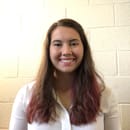Last weekend I attended the 2019 Great Lakes Glia Meeting in Traverse City, Michigan (see me with my poster in the picture below!). This was my first research conference, and I was in the minority in more than one way. Not only was I a first-time conference attendee and an undergrad among grad students, postdocs and PIs, but the conference was also a bit outside my research area. Due to this, I knew that I’d benefit enormously from the experience as a scientist. However, there were some important non-science lessons I hadn’t anticipated learning.
I learned that you should dress comfortably because conference days are very long. I learned that you should be social because you never know who you’ll meet and what advice people may have for you. I learned that you should bring your own pen to each session because there’s no guarantee that the one you’re provided will work. I learned that you should know your work inside and out, know it’s pitfalls, what you would do differently and what you’re doing next. All of these things are important, but what stood out to me the most over the course of the meeting was that while we as scientists need criticism and guidance, we aren’t always great at sharing our expertise.
I got to observe a lot of interactions between researchers. Some were friendly and productive, but others felt more like a struggle for superiority of intellect. My research mentor always insists that our focus is – and always should be – the science. We come together as researchers at these meetings to share our ideas and try to do our work more effectively. However, at times during the conference, the criticism that was delivered felt more like an attack on the scientists themselves. It was as if they were saying, “You did this wrong,” or “Your techniques aren’t sound,” rather than suggesting ways to shed light on the data. As with anything, the content of one’s research needs to be separated from the person doing it. This is an issue of respect as well as an issue of productivity. Criticism is crucial to producing good and reliable data. However, criticism without strategy for improvement makes the process of procuring good and reliable data slow and challenging. There is so much expertise to be shared in a roomful of PhDs passionate about the same thing. We should always be striving to make the most of that potential.
So, how do we fix this? How do we promote a culture of focusing on the science? I’m fortunate to have an excellent research mentor who has been teaching me not only the ins and outs of my lab work and how to attack any future work I may attempt but also how to be a good, kind and productive scientist and critic of science. Based on this, I think that a lot of our ability and inclination to appropriately critique each other come from the examples set for us by the teachers and leaders that we admire in our field. It’s not enough to merely say that the research mentors that currently exist should just start being visibly respectful and constructive critics (though they should). I have found that one of the biggest pitfalls of my scientific education has been what it means to be a scientist outside of the lab. There is a lot of strategy and politics in advancing yourself in science, as with any other field. The number of non-scientific things you have to do to stay ahead of the curve shocked me when I started learning about it. This conference was one of those instances when I realized that no amount of biochemistry knowledge would prepare me to live out my ideals and my biochemical passions in a way that I’d be proud of. STEM curriculum needs to incorporate life lessons beyond the facts. Beyond the procedures. There’s more to scientists than their data — there should be more to science education than the facts.
Follow HCND on Twitter, like us on Facebook, Pin with us and show our Instagram some love!
Photo 1 provided by author, 2


